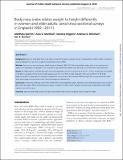Body mass index relates weight to height differently in women and older adults : serial cross-sectional surveys in England (1992–2011)
Abstract
Background Body mass index (BMI) tends to be higher among shorter adults, especially women. The dependence of BMI–height correlation on age and calendar time may inform us about temporal determinants of BMI. Methods Series of cross-sectional surveys: Health Survey for England, 1992–2011. We study the Benn Index, which is the coefficient in a regression of log(weight) on log(height). This is adjusted for age, gender and calendar time, allowing for non-linear terms and interactions. Results By height quartile, mean BMI decreased with increasing height, more so in women than in men (P < 0.001). The decrease in mean BMI in the tallest compared with the shortest height quartile was 0.77 in men (95% CI 0.69, 0.86) and 1.98 in women (95% CI 1.89, 2.08). Regression analysis of log(weight) on log(height) revealed that the inverse association between BMI and height was more pronounced in older adults and stronger in women than in men, with little change over calendar time. Conclusions Unlike early childhood, where taller children tend to have higher BMI, adults, especially women and older people, show an inverse BMI–height association. BMI is a heterogeneous measure of weight-for-height; height may be an important and complex determinant of BMI trajectory over the life course.
Citation
Sperrin , M , Marshall , A D , Higgins , V , Renehan , A & Buchan , I E 2016 , ' Body mass index relates weight to height differently in women and older adults : serial cross-sectional surveys in England (1992–2011) ' , Journal of Public Health , vol. 38 , no. 3 , pp. 607-613 . https://doi.org/10.1093/pubmed/fdv067
Publication
Journal of Public Health
Status
Peer reviewed
ISSN
1741-3842Type
Journal article
Description
This study was partly supported by the University of Manchester’s Health eResearch Centre (HeRC) funded by the Medical Research Council (MRC) Grant MR/K006665/1 and partly funded by the ESRC Obesity eLab Grant (RES-149-25-1076).Collections
Items in the St Andrews Research Repository are protected by copyright, with all rights reserved, unless otherwise indicated.

